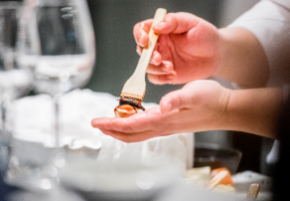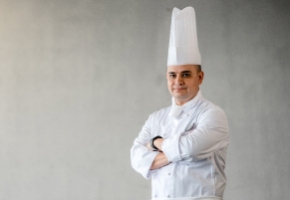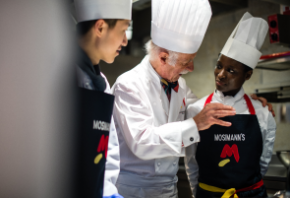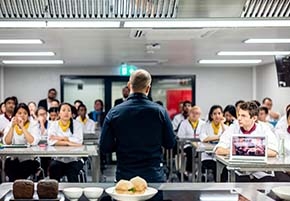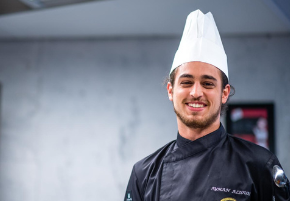- About
- Programs
- Campus Life
- Career Services
- Admissions
- News & Events
- Alumni
How to Become a Food Critic: Education, Skills, and Tips
Discover how to become a food critic with these essential steps. Learn about education, experience, and skills needed to succeed in food writing.
Key Takeaways
- A food critic is a professional who evaluates and writes about food and dining experiences.
- Becoming a food critic involves culinary education, industry experience, writing practice, building a strong personal brand, and professional networking.
- Food critics need sharp observation, excellent writing, deep culinary knowledge, and the ability to judge impartially.
No one likes wasting time or money on something that doesn't live up to the hype. Whether it be a movie, a new restaurant, a book, or even a skincare product, it helps to hear from others before deciding if it's worth trying.
When it comes to food, that responsibility falls to professional food critics. It's a role that is rooted in curiosity, fairness, and, of course, a love of food. Therefore, for anyone interested in this line of work, becoming a food critic necessitates having a solid understanding of what, in terms of culinary standards rather than personal preference, makes a dish great.
What Is a Food Critic?
Just as movie critics assess films for their storytelling, direction, and performances, food critics evaluate meals and dining experiences in detail. They don't simply judge whether something tastes good; they analyze how and why it works and whether it meets professional culinary standards.
Hence, a food critic is a professional who evaluates the food, presentation, service, ambiance, and overall value at restaurants and eateries.
Start Your Culinary Journey
Learn the art of cooking in a world-class environment
Since the appreciation or dissatisfaction of a reputable food critic can often influence public opinion or even determine a restaurant's future, many chefs and establishments take their criticism seriously.
Roles and responsibilities
Eating the food might be the highlight of the job, but there's much more that a food critic takes on. They are responsible for:
- Writing detailed and engaging reviews for the media
- Offering constructive feedback based on culinary standards and industry expertise
- Researching food trends, chefs, restaurants, and regional cuisines
- Visiting new or noteworthy dining establishments anonymously
- Maintaining objectivity, even when meals are complimentary
- Setting trends or helping shape public opinion in the food world
- Staying updated on health, sustainability, and culinary innovation topics
How to Become a Food Critic
To turn food criticism into a career, you must work hard and become someone people trust—someone who understands the culinary arts, techniques, flavor balance, sourcing, and presentation.
To become a food critic, you must learn how to stay fair, whether you're reviewing a five-course meal from a Michelin-starred chef and restaurant, sampling a humble street vendor's signature dish, visiting a trendy pop-up, or sitting down at a family-run cafe. What matters is the food and your ability to evaluate it.
Obtain relevant education
Anyone can taste food and say whether they like it or not. However, food critics are trained to notice what most people miss, like how ingredients interact, whether a dish was executed with technical skill, how it fits into a cultural or culinary tradition, and whether it achieves what it sets out to do. That kind of analysis takes education and practice.
The strongest foundation for a career in food criticism starts with a culinary degree. At Culinary Arts Academy Switzerland (CAAS), the Bachelor of Arts in Culinary Arts is the top choice for aspiring professionals. This program combines in-depth culinary training with business and hospitality skills that allow graduates to speak with authority across the industry.
For those looking for a shorter path, the Swiss Diploma in Culinary Arts is another excellent choice. It provides a focused and intensive education that still offers hands-on experience in classical and modern cooking techniques.
If you're interested in a more specialized angle—say, reviewing vegan and vegetarian restaurants or developing food writing centered on health-focused cuisine—you might choose the Swiss Certificate in Vegetarian and Plant-Based Culinary Arts, also offered at CAAS.
To strengthen your ability to communicate your thoughts clearly and compellingly, consider also specifically taking courses related to writing, food criticism, communications, journalism, or media studies. These will support you in organizing your reviews, interacting with readers, and articulating expert viewpoints in a way that is both credible and educational.
Gain work experience
Gaining hands-on experience is one of the most effective ways to establish credibility as someone who truly understands food and the industry itself. Before you can fairly critique a dish or dining experience, you need to have some real insight into how restaurants operate, how dishes are prepared under pressure, and what it actually takes to deliver consistent quality. That's why aspiring food critics should seriously consider working in kitchens, catering, or any part of the food and hospitality industry.
Another way to deepen your knowledge is by shadowing or interning with experienced critics, food journalists, or media outlets. These opportunities allow you to learn how critiques are developed, how feedback is refined, and how editorial decisions are made. Internships, in particular, offer the chance to sharpen your voice and build your credibility while being mentored by people already established in the field.
At CAAS, we know the value of experience across all careers. That's why our Career Services team is dedicated to helping students and recent alumni prepare for real-world opportunities. From career readiness programs to job search support and personalized guidance, we assist our students every step of the way.
Our team organizes events and customized services tailored specifically to the culinary student community of CAAS, opening doors to internships and jobs in leading industries worldwide.
Many of our alumni have seen firsthand how impactful real-world experience can be. Maryia, for instance, described her internship as a powerful learning opportunity:
The experience taught me a lot about hospitality, operations, and teamwork, and how to work in a diverse cultural environment. Every single one of my experiences taught me so much and made me stronger.
Another example is Sal, who interned at Nobu in Doha during the World Cup. Reflecting on the experience, he shared,
I never stopped learning and was always evaluated in a great way that helped me improve.
Experiences like these aren't just lines on a resume. They determine the way future food critics see, understand, and write about food.
Start writing and build a portfolio
Once you have a feel for how kitchens operate, what defines a well-executed dish, how service flows in different dining settings, and how to speak the language of the culinary world, the next step is to start writing. Creating your own food blog is a great way to begin this step, as it enables you to practice forming clear, thoughtful opinions while building a personal archive of your work.
You can write restaurant reviews, explore ingredient profiles, document food-related travel, or analyze food trends. Over time, the practice will help sharpen your voice as well as generally help you understand what topics resonate with readers.
You should also start building an online portfolio, as it adds professionalism to your efforts. It should include a curated selection of your best pieces, updated regularly with new writing, photos, or media appearances.
Building a portfolio requires continuous learning from feedback, following shifts in culinary culture, attending events or tastings, and challenging yourself to try new writing formats like long-form features, quick opinion pieces, or even video scripts. Over time, your portfolio should be a direct showcase of your skills and a reflection of your evolving perspective as a food critic.
Build a personal brand
Even as a critic, you're also a personality, and that makes you a brand in your own right. With countless voices out there, what sets you apart isn't just your taste but your tone, your focus, and how you communicate with your audience.
Use social media platforms like Instagram, Facebook, TikTok, or even Substack to share your latest reviews and, more importantly, to connect with fellow food lovers, chefs, and diners. The more consistently you share high-quality, thoughtful content, the more recognizable you become.
Whether you specialize in fine dining, spotlight vegan and vegetarian cuisine, cover the fast food scene, or explore regional street food traditions, building your niche helps followers know what to expect—and why they should return for more.
Network and seek opportunities
Even though food critics are expected to stay objective, building strong professional relationships is still essential. After all, you can't report on the food world without being part of it.
To grow in this field, you need to expand your network with chefs, restaurateurs, fellow critics, editors, and culinary educators. These relationships open doors to behind-the-scenes experiences, industry insights, and publishing opportunities that simply aren't available to outsiders. Food festivals, press events, restaurant openings, and culinary symposiums are great places to meet key players and start meaningful conversations.
At CAAS, we recognize how essential these connections are. That's why our students begin professional networking early through the International Recruitment Forum (IRF), a prestigious event that takes place twice a year and connects students with over 100 global recruiters.
From world-renowned hotel groups and restaurants to event companies and cruise lines, students gain exclusive access to top employers like the Four Seasons, Ritz Paris, and Belmond. For anyone serious about entering the food world with credibility and contacts, this kind of access can and will make all the difference.
Essential Skills and Qualities
To be a good food critic, you should focus on developing the following skills and qualities to the fullest:
- Strong writing and storytelling skills
- Sharp attention to detail
- Objective and fair judgment
- Excellent communication and interpersonal skills
- Curiosity about global cuisines and culinary techniques
- Time management and organization
- Adaptability across formats (print, digital, social media)
- Research skills and cultural awareness
- Confidence to critique honestly without bias
Why People Trust Food Critics
What Ruth Reichl, Pete Wells, Jay Rayner, and Soleil Ho write about a restaurant can shift public opinion—or lead to fully booked tables for months. Their words carry weight because they know exactly what to look for. They’ll catch a sauce that’s just a touch too salty or a texture that doesn’t match the dish’s promise. And once they point it out, it makes perfect sense to the reader, too.
The psychology is simple: we trust people who know more than we do, especially when they consistently show good judgment. A food critic earns that trust not by being harsh but by being well-informed and honest. Their credibility rests on their culinary expertise, their ability to write clearly and without bias, and the consistency of their standards.
Make Your Mark in the Culinary Review World
Over time, readers will trust you and keep coming back for more reviews because of your expertise, honesty, insight, curiosity, and dependability. The more you train your eye and sharpen your palate, the more your voice will matter in culinary conversations.
As long as you know what to look for and what details make a difference, your critiques can guide diners toward memorable meals and give chefs thoughtful feedback that helps them grow.
So, pursue your passion at CAAS. Our programs offer the training and industry access needed to succeed as a credible, respected food critic. Like many of our graduates who've built rewarding careers in the culinary arts, you'll leave with the insight and experience to make your mark in the culinary review world.
Frequently Asked Questions
How to become a Michelin food critic?
To become a Michelin food critic, you need extensive culinary knowledge, strong writing and observational skills, years of experience in the food or hospitality industry, and a proven ability to evaluate restaurants impartially and professionally.
How many hours do food critics work?
Food critics often work irregular hours, including evenings and weekends, to dine out, write reviews, and meet publication deadlines. This can average anywhere from 40 to 60 hours a week, depending on assignments.
What are the benefits of being a food critic?
There are many benefits, as the role enables you to explore different cuisines, influence culinary trends, build industry connections, and turn a passion for food and writing into a respected career.
Interested in studying at CAAS? Download our brochure to learn about our programs!


